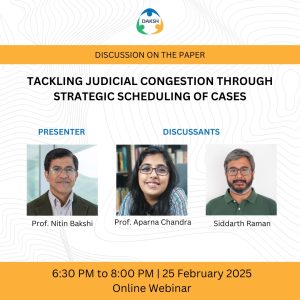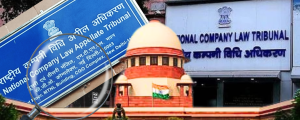

Data Dictionary
Act – The law (passed by a legislative body) that applies to a specific Case.
Action Date – The date on which an action – a proceeding or order – takes place in court.
Before Honourable Judges – A public officer authorised to hear and decide cases in a court of law.
Bench – The location of a court. For example, Dharwad Bench of the Karnataka High Court. Not applicable in District Courts.
Case Category – A field indicative of the subject matter of the case or the legal statute under which it is filed.
Case Classification – The classifications of case types by the registry for administrative purposes of listing before judges.
Case Number – A number for each case, listed usually with a case type and the year. See combined case number.
Case Originated From – Administrative information maintained by registry on the manner of filing of the case.
Case Type – A case type is a classification laid out by each High Court or District Court that allows cases to be sorted. A case type is based on the subject matter of a case.
Category – (created by DAKSH) –A specific classification mechanism for case types generated by DAKSH.
Cause List Date – The date on which a case appears in the list issued by the Registry of the matters to be heard by the court on any day
Combined Case Number – A unique identification number for each case, made up of three components: a case type, the said number, and the year in which the case was instituted.
Court District – The district in which a court operates.
Court Hall Number – The location of the High Court in which a case is heard.
Court Name – The name of the High Court in which a case is in process.
Court State – The state where the court is located.
Court Type – A string that identifies the type of court this particular record applies to (High Court, District Court, etc.)
Current Stage – The stage at which a case is, within the process in the court.
Current Status – The situation of a case in process of the High Court; usually “disposed” or “pending”
Date Filed – The date on which a case is instituted and admitted into the High Court by the registry.
Date of Hearing – The date on which a case appears in the court
Decision Date – The date on which final orders for a case are pronounced.
Disposal Date – The date on which a case is completed its course in the High Court, with the judge making a ruling.
District – The geographical division of the State from which a case comes into the High Court.
F I R No – The number assigned to a First Information Report (FIR), a written document prepared by the police when they receive information about the commission of a cognizable offence.
Filing Number – The number assigned to the filing of a case by the registry.
First Hearing Date – The date on which a case is first heard in a court before a judge.
Hearing Date – The date listed by the registry for on which the case will be heard in the court.
Last Action Taken – The decision taken by a judge in the proceeding prior to the one listed in our database.
Last Date Of Action – The date on which an action was taken prior to the current case record.
Last Listed On – The last date on which a case was listed before a judge, for hearing, in a court.
Last Posted For – The stage that the case was last listed under, in the proceeding prior to the one listed in the database.
Last Sync Time – The last time details of a case have been synced in the DAKSH database.
Latest Order – The last decision made by a court or judge prior to the one listed in the database.
Listed Times – The number of times a case has been heard by a judge in the court.
Listing Date – The date on which a case is to appear, as listed by the court registry.
Lower Court Case Number – The case number listed against the case record in the lower court from which it originated.
Lower Court Disposal Date – The date in which a judge made his final ruling in a case in the lower court, before the case moved to the High Court on appeal.
Lower Court District – The district from which a case record has come to a higher court from a lower court from which it originated.
Lower Court Judges – The judges who heard a case in the lower court from which a case has originated.
Lower Court Judgment Date – The date on which the final pronouncement and judgement was made in the lower court from which a case originated it.
Lower Court Name – The name of the court in the lower judiciary, from which the case has moved to the High Court on appeal.
Lower Court Other Details – Further details listed against a case record pertaining to the lower court of its origin.
Next Hearing Date – The date listed by the registry for the next potential date in which the case will be heard in the court.
Next Listing Court – The court at which the next hearing of a case will take place.
Next Listing Date – The date on which a case will next be heard as listed by the registry.
Next Listing Purpose – The legal process under which a case will next be heard.
Next Listing Time – The time on which a case will appear before a judge following the current hearing.
Order Type – The classification of a direction of a court or judge normally made or entered in writing during the proceedings of a case.
Petitioner – The party who presents a petition in court of law.
Petitioner Address – The address of the party who presents a petition in court of law.
Petitioner Advocate – The lawyer who is currently dealing with a case on behalf of a petitioner.
Petitioner Type – The nature of the party who presents a petition in court of law.
Police Station – The name of the police station with which case details are associated.
Police Station Name – Same as above.
Purpose – The specific stage of the legal process under which a case is to be heard.
Respondent – A party against whom a petition is filed. Often dealing with appeals. Can be the plaintiff or defendant from lower court.
Respondent Address – The address of the party against whom a petition is filed. Often dealing with appeals. Can be the plaintiff or defendant from lower court.
Respondent Advocate –The lawyer litigating on behalf of the party against whom a petition is filed.
Respondent Type – The nature of a party against whom a petition is filed.
Stage Name – The administrative record of the specific stage of the legal process in a court.
Stage Of Case – The stage at which a case is, within the process in the court.
Supercategory – (created by DAKSH)
A form of classification devised by DAKSH to better group the case types
Under Acts – The central or state statute under which a case is listed.
Under Sections – The distinct and numbered subdivisions in legal statutes under which a case is listed.
Year – The year in which a case is filed.
Appearance Date –
The date on which a case appears before a judge in a court.
Before Honourable Judges
The judge before whom a case appears in a court.
Before Honourable Judge Five
Before Honourable Judge Four
Before Honourable Judge One
Before Honourable Judge Three
Before Honourable Judge Two
In cases where more than ONE judge is in a hearing, the Court data includes all names in the field ‘before_honourable_judges’. Where possible, the parsing mechanism breaks that into up to five separate Judge names and puts them into the above data attributes.
This happens correctly where Judge names are separated by comma – that’s maybe 50% of the cases. Where not possible, the full ‘before_honourable_judges’ column data is copied into ‘before_honourable_judge_one’.
Combined Case Number – A unique identification number for each case, made up of three components: a case type, the said number, and the year in which the case was instituted.
Current Stage – The stage at which a case is, within the process in the court.
Hearing Date – The date listed by the registry for the next potential date in which the case will be heard in the court.
Last Action Taken – The decision taken by a judge in the proceeding prior to the one listed in our database.
Last Date of Action – The date on which an action was taken prior to the current case record.
Last Order – The last decision made by a court or judge prior to the one listed in the database.
Last Posted For – The stage that the case was last listed under, in the proceeding prior to the one listed in the database.
Next Hearing Date – The date listed by the registry for the next potential date in which the case will be heard in the court.
Order Type – The classification of a direction of a court or judge normally made or entered in writing during the proceedings of a case.
Petitioner Advocate – The lawyer who is currently dealing with a case on behalf of a petitioner.
Purpose Of Hearing – The legal process under which a case will be heard.
Respondent Advocate – The lawyer who is currently dealing with a case on behalf of a respondent.
Sync Date – The last time details of a case have been synced in the DAKSH database.
RECENT ARTICLES


Webinar on Fast-tracking M&A Approvals and the NCLT

Webinar on Tackling Judicial Congestion Through Strategic Scheduling of Cases

Year in Review: NCLT and NCLAT Under the Supreme Court’s Microscope

-
Rule of Law ProjectRule of Law Project
-
Access to Justice SurveyAccess to Justice Survey
-
BlogBlog
-
Contact UsContact Us
-
Statistics and ReportsStatistics and Reports
© 2021 DAKSH India. All rights reserved
Powered by Oy Media Solutions
Designed by GGWP Design